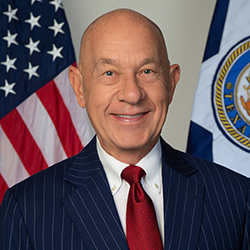UPDATE: It’s blocked again!
A federal appeals court late Tuesday night stopped a state law allowing Texas police to arrest people suspected of illegally crossing the Texas-Mexico border — hours after the U.S. Supreme Court had allowed it to go into effect.
Earlier in the day, the high court had allowed the law to go into effect after it sent the case back to the appeals court, urging it to issue a ruling promptly. The appeals court soon scheduled a hearing for Wednesday morning. And on the night before hearing oral arguments the appeals court issued an order to let a lower court’s earlier injunction stopping Senate Bill 4 stand, according to a filing.
The Supreme Court earlier Tuesday let SB 4 go into effect but stopped short of ruling on the law’s constitutionality, which has been challenged by the Biden administration.
Steve Vladeck, a University of Texas at Austin law professor, said the back-and-forth is “indefensibly chaotic.”
“Even if that means SB 4 remains paused indefinitely, hopefully everyone can agree that this kind of judicial whiplash is bad for everyone,” he said.
The same Fifth Circuit whose “administrative hold” on the district court’s ruling led to this indefensible chaos is the court that put the law on pause again. What an absolute nightmare. Below is what I wrote originally. It all still stands except for the fact that the law is once again on hold. Read on…
WTF?
The U.S. Supreme Court in a 6-3 decision on Tuesday ruled that a law allowing Texas police to arrest people suspected of illegally crossing the Texas-Mexico border can take effect while a legal battle over the new state law empowering local law enforcement plays out.
The decision comes a day after the high court had extended its temporary block of the law.
Justice Samuel Alito had issued the block as the high court considered an appeal from the Biden administration, which has argued Senate Bill 4 is unconstitutional because it interferes with federal immigration laws.
The legal case is far from over. The case will now go back to the U.S. 5th Circuit Court of Appeals. Eventually it has to be resolved in a federal court in Austin, where the lawsuits were originally filed.
The Supreme Court didn’t rule whether the law is constitutional, but said that the appeals court didn’t follow the rights steps when it reversed a federal judge’s order blocking SB 4 from going into effect.
“That puts this case in a very unusual procedure posture,” Justice Amy Coney Barrett wrote in her opinion, which was joined by Justice Brett Kavanaugh.
“I think it unwise to invite emergency litigation in this court about whether a court of appeals abused its discretion at this preliminary step,” Barrett wrote in her opinion.
Barrett also said that if the 5th Circuit doesn’t issue its own order soon on whether the law can take effect while the appeals court weighs SB 4’s constitutionality, the case can go back to the Supreme Court, which could decide whether the law is constitutional.
Meanwhile, Justice Sonia Sotomayor, one of the three liberal justices who voted no Tuesday, said her colleagues are wrong for not continuing to block the law, writing in her dissent that the Supreme Court “invites further chaos and crisis in immigration enforcement.
“Although the Court today expresses no view on whether Texas’s law is constitutional, and instead defers to a lower court’s management of its docket, the Court of Appeals abused its discretion by entering an unreasoned and indefinite administrative stay that altered the status quo,” she added.
See here for the previous update. If you feel like you’ve got whiplash, join the club. TPM adds some details.
The law — and the Supreme Court’s Tuesday order — contravenes the 2012 Arizona v. U.S. Supreme Court ruling, which upheld federal supremacy over immigration law.
It sets up a mind-boggling conflict between state and federal authority. A person with federal permission to be in the United States could now face 20 years in Texas prison if they ignore an order, issued by a Texas state judge under the law, to leave the country.
The Supreme Court’s decision to allow the law to go into effect, however, may be ephemeral. It dealt with whether or not to put the law on hold, sidestepping the merits of the law, which the Court will almost certainly be asked to consider.
A Texas federal judge had paused enforcement of the law, which was passed last year. Texas appealed that ruling to the right-wing 5th Circuit Court of Appeals, which said, via an administrative order, that the law could begin to take effect. It has yet to respond to an emergency stay motion from the Biden administration.
Justices Amy Coney Barrett and Brett Kavanaugh wrote a five-page statement concurring with the order, saying that, for procedural reasons, it was not the right time for the Supreme Court to weigh in. Their logic effectively shunted the Court’s authority to decide the case off to what it described as the 5th Circuit’s “exercise of its docket management authority.”
“It is surprising that both the parties and the panel contemplated from the start that this Court might review an administrative stay,” Barrett and Kavanaugh remarked.
The judges left open the possibility that they may stay the Texas law once a stay appeal that they deem procedurally appropriate appears before them. It also left open the possibility that they may strike down Texas’ law once they are asked to consider it.
Nonetheless, the decision to allow Texas’ state deportation law to take effect signals a fundamental openness to SB 4’s central proposition: that the federal government does not have supremacy over the states in border enforcement.
The ruling opens the door to a morass of potential issues. Per federal law, those seeking asylum have the right to protection — including to stay in the United States — until a determination is made as to whether or not they qualify. The Supreme Court’s decision could then pit state and federal officials with competing and undefined obligations against each other.
Slate calls BS on the whole thing.
We don’t know why Chief Justice John Roberts, Justices Clarence Thomas, Neil Gorsuch, or Samuel Alito voted to let S.B. 4 spring into action. But Justice Amy Coney Barrett, joined by Justice Brett Kavanaugh, proffered a weak excuse for the capitulation. The 5th Circuit, she noted, did not issue a traditional stay of the district court’s injunction (called a “stay pending appeal”), which the justices could review. Instead, the 5th Circuit styled its order as an “administrative stay.” These stays are meant to briefly preserve the status quo while a court considers whether to issue more formal, lasting relief. SCOTUS does not typically look at mere administrative stays due to their fleeting and informal nature; it prefers to wait for a formal stay before jumping in. So the 5th Circuit has begun to call its most controversial stays “administrative” in a brazen bid to insulate them from probing Supreme Court review.
On Tuesday, it worked. Barrett called the 5th Circuit’s administrative stay “an exercise of its docket-management authority,” declaring that SCOTUS should not “get into the business” of reviewing “a short-lived prelude to the main event.” In other words, because the 5th Circuit used the magic word administrative to describe its (indefinite) stay, Barrett refused to consider whether S.B. 4 should be kept on ice while the merits are reviewed. She simply rubber-stamped the 5th Circuit’s stay, rewarding its shameless gamesmanship. The only silver lining here is that Barrett appears to recognize the broader pattern “lurking” here: defiant lower courts recasting stays as “administrative” to thwart Supreme Court review for months with no endpoint in sight. “The time may come, in this case or another, when this court is forced to conclude that an administrative stay has effectively become a stay pending appeal and review it accordingly,” she tsked, sending a warning signal to the 5th Circuit. “But at this juncture in this case, that conclusion would be premature.” (Barrett did not explain why SCOTUS did not just issue its own injunction against S.B. 4, as it undoubtedly could have.)
Justice Sonia Sotomayor’s sharp dissent, joined by Justice Ketanji Brown Jackson, was far less tolerant of the 5th Circuit’s duplicity. (Justice Elena Kagan also dissented in a brief separate opinion urging that an administrative stay not be used to “spell the difference between respecting and revoking long-settled immigration law.”) Sotomayor noted that the 5th Circuit “recently has developed a troubling habit of leaving ‘administrative’ stays in place for weeks if not months,” citing stays that dragged on for as long as 85 days. In reality, she explained, this benign-sounding tool has developed into an act of extreme judicial gaslighting. The administrative stay here, she wrote, “not only upends the status quo but also extends that disruption indefinitely.” In the process, it “defeats the purpose of this court’s stay analysis and threatens to evade effective review of this unprecedented law.” This play is largely a repeat of S.B. 8, Texas’ 2021 vigilante abortion ban, which SCOTUS allowed to take effect in the dark of night, without any reasoned analysis—after the 5th Circuit froze a district court’s injunction with (you guessed it) an administrative stay. (In her opinion on Tuesday, Barrett wrongly claimed that the Supreme Court has never reviewed an administrative stay, evidently forgetting the S.B. 8 fiasco.)
Had the court called BS on the 5th Circuit and applied its usual standards to the stay, Sotomayor correctly noted, it would have no choice but to halt S.B. 4. When you tot up the balance of alleged irreparable harms here, it isn’t even a close call. On the one side of the ledger, Texas claims to suffer a temporary inability to repel an immigration “invasion.” On the other side, the federal government stands to suffer irreparable harm to its foreign relations, its international obligations to protect individuals fleeing from persecution or torture, and its ability to carry out legitimate immigration enforcement. Meanwhile, noncitizens face unimaginable harm now that Texas can arrest and deport them with zero regard for their rights under federal law. None of these evils can be readily unwound, and the Supreme Court had previously held unequivocally that states cannot arrogate the federal government’s power over immigration policy and enforcement. These facts should have been reason enough for SCOTUS to block S.B. 4 immediately.
Reading the Barrett and Sotomayor opinions side by side, there is a bit less of a delta than you might assume. What’s strange about Barrett’s opinion is that she clearly recognizes the 5th Circuit’s bad behavior, yet suspends any appropriate response for the time being. A cynic might think Barrett knows S.B. 4 is obviously unconstitutional but wants to punish the Biden administration for its allegedly lax border enforcement by letting the law kick in for a few weeks. Her opinion implicitly faults both parties, Texas and the federal government, and gives Texas a reprieve this time—to the detriment of immigrants, Latinos, and the basic principle of federal supremacy. “If a decision does not issue soon, the applicants may return to this court,” she cautioned the 5th Circuit. In the meantime, cruelty and nullification will reign in Texas, but just for an indefinite while.
Just a capital-F Farce from top to bottom. It’s not even clear how the state plans to exercise its newfound illegitimate authority, as the Chron notes.
It is unclear exactly how the law will work in practice, and its rollout could be complicated. It is unclear if Mexico will accept migrants the state tries to send back across the border. The Mexican government has been vocally critical of the law. Advocates, meanwhile, have raised concerns that it will lead to racial profiling, as it empowers any state or local officer to arrest those they believe entered the state illegally.
The Department of Public Safety and Texas Military Department, which have run Gov. Greg Abbott’s border crackdown, Operation Lone Star, did not immediately respond to requests for comment on enforcement plans. Nor did Abbott’s office. DPS refused to release enforcement plans to Hearst Newspapers, citing the ongoing litigation.
Victor Escalon, a Department of Public Safety director overseeing operations in South Texas, said in sworn statements before the court that the agency would focus enforcement in counties that are close to facilities operated by the Texas Department of Criminal Justice and the state, though he did not specify which facilities. He said DPS officers would have probable cause to make arrests when they witness migrants crossing between ports of entry. He said DPS expects to house and process migrants detained under SB 4 primarily in state-owned facilities and does not anticipate a need for “extensive” use of county-owned jails.
Escalon said that if Mexican authorities do not accept migrants who have been ordered back across the border, the escorting DPS officer will deliver the migrants to the American side of a port of entry and observe them go to the Mexican side. After watching them cross, the officer will consider them to have complied with the return order and will cease monitoring the alien, he said.
The state wrote separately in legal filings before the high court that authorities would turn migrants over to federal immigration officials at ports of entry — a departure from how Texas Republicans have previously discussed the law as a means for the state to deport migrants.
I don’t even know what to say. Well, there’s this:
Translation: “Mexico expresses its rejection of the Supreme Court’s decision of US for the entry into force of the SB4 law. Our country will not accept repatriations from the state of Texas. The dialogue on immigration matters will continue between the federal governments of MX and US”.
And this:
That would be tomorrow, so get ready for more news. I suppose there’s at least a chance that this could be undone quickly. I’m going to hope for that. Law Dork has more.















